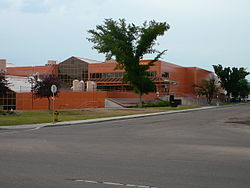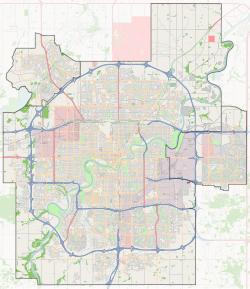West Jasper Place | |
|---|---|
Neighbourhood | |
 The Orange Hub (formerly the MacEwan University Centre for the Arts) is located in West Jasper Place | |
Location of West Jasper Place in Edmonton | |
| Coordinates: 53°32′13″N 113°35′06″W / 53.537°N 113.585°W | |
| Country | Canada |
| Province | Alberta |
| City | Edmonton |
| Quadrant[1] | NW |
| Ward[1] | Nakota Isga |
| Sector[2] | Mature area |
| Area[3][4] | Jasper Place |
| Government | |
| • Administrative body | Edmonton City Council |
| • Councillor | Andrew Knack |
| Area | |
• Total | 0.89 km2 (0.34 sq mi) |
| Elevation | 673 m (2,208 ft) |
| Population (2012)[7] | |
• Total | 2,966 |
| • Density | 3,332.6/km2 (8,631/sq mi) |
| • Change (2009–12) | |
| • Dwellings | 1,696 |
West Jasper Place is a residential neighbourhood in west Edmonton, Alberta, Canada. Originally part of the Town of Jasper Place, West Jasper Place became a part of Edmonton when Edmonton and Jasper Place amalgamated on August 17, 1964.
While most of the neighbourhood is residential, there is some commercial development, with most of this adjacent to Stony Plain Road at the neighbourhood's north end. This development includes the Jasper Gates shopping centre.
The neighbourhood is bounded by 149 Street on the east, 95 Avenue on the south, 156 Street on the west, and Stony Plain Road on the North.
The community is represented by the West Jasper/Sherwood Community League. Which maintains a community hall, outdoor rink and tennis courts located at 152 Street and 96 Avenue.[8][9] The West Jasper Place Community League operated as a separate entity from 1950 until 1985 when it merged with the Sherwood Community League.[9]
Demographics
In the City of Edmonton's 2012 municipal census, West Jasper Place had a population of 2,966 living in 1,696 dwellings,[7] a -2.9% change from its 2009 population of 3,055.[10] With a land area of 0.89 km2 (0.34 sq mi),[6] it had a population density of 3,332.6 people/km2 in 2012.[7][6]
According to the 2005 municipal census, one in five (17.9%) of the population moved into the neighbourhood within the previous 12 months. Another one in four (23.9%) had moved within the previous one to three years. Only two out of every five (42.7%) had lived at the same address for five years or more.[11] This is similar to the city at large.[12]
Just over half (51%) were male and just under half (49%) were female.
Residential development
According to the 2001 federal census, just under one third (29.4%) of the residential dwellings in the neighbourhood were built prior to the 1964 amalgamation of Jasper Place and Edmonton, with a significant number of those being built prior to the 1945 end of World War II. Approximately half (48.2%) of the residences were built between 1960 and 1980. The remaining 22.4% were built after 1980, with a particular spike in residential construction occurring in a short span during the early 1990s, when one in ten (11.7%) of residences were constructed.[12]
In 2005, three out of every five residences (59.3%) were rented apartments, including a small number of apartment style condominiums. Most of these are in low rise buildings with fewer than five stories. Another third of the residences (35.5%) were single detached houses. A small number (5%) were duplexes.[11]
Approximately two out of every three (68%) of all residences are rented.[11]
Schools
Sherwood Elementary School was operated by the Edmonton Public School System. This school was purchased by Conseil scolaire Centre-Nord and will reopen in 2024 as a K-6 francophone school.[13]
The Centre for the Arts Campus (formerly Jasper Place Campus) of MacEwan University was located near the north west corner of the neighbourhood. This building is now known as the Orange Hub and houses the Yellowhead Tribal College.
Parks and green space
There is a single park in the neighbourhood, Arthur Elliot Park.
Bike trails in the MacKinnon Ravine, located just across 149 Street in the Crestwood neighbourhood, provide access to the city's River Valley Park System.
Surrounding neighbourhoods
Adjacent neighbourhoods are Crestwood, Parkview, Sherwood, Meadowlark Park, Glenwood, Britannia-Youngstown, Canora and Grovenor. These are all residential neighbourhoods.
See also
References
- ^ a b "City of Edmonton Wards & Standard Neighbourhoods" (PDF). City of Edmonton. Retrieved February 13, 2013.
- ^ "Edmonton Developing and Planned Neighbourhoods, 2011" (PDF). City of Edmonton. Retrieved February 13, 2013.
- ^ "The Way We Grow: Municipal Development Plan Bylaw 15100" (PDF). City of Edmonton. 2010-05-26. Retrieved February 13, 2013.
- ^ "City of Edmonton Plans in Effect" (PDF). City of Edmonton. November 2011. Retrieved February 13, 2013.
- ^ "City Councillors". City of Edmonton. Retrieved February 13, 2013.
- ^ a b c "Neighbourhoods (data plus kml file)". City of Edmonton. Retrieved February 22, 2013.
- ^ a b c "Municipal Census Results – Edmonton 2012 Census". City of Edmonton. Retrieved February 22, 2013.
- ^ "West Jasper/Sherwood Community League". West Jasper/Sherwood Community League. Retrieved October 14, 2017.
- ^ a b Kuban, Ron (2005). Edmonton's Urban Villages: The Community League Movement. University of Alberta Press. ISBN 9781459303249.
- ^ "2009 Municipal Census Results". City of Edmonton. Retrieved February 22, 2013.
- ^ a b c 2005 Municipal Census: Structure Type: West Jasper Place (PDF) (Report). The City of Edmonton. 2005.
{{cite report}}: Unknown parameter|agency=ignored (help) - ^ a b 2005 Municipal Census: Length of Residence: Edmonton (PDF) (Report). The City of Edmonton. 2005.
{{cite report}}: Unknown parameter|agency=ignored (help) - ^ "À Edmonton, une nouvelle école francophone de la maternelle à 6e année va naître en 2024". 19 March 2024.









